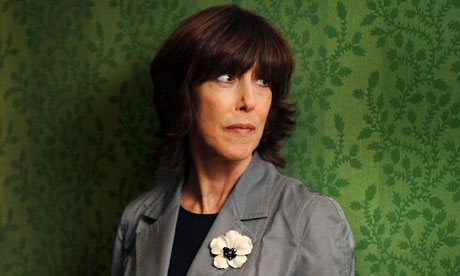those certain females: nora ephron
 I have a confession to make: I love the movie You’ve Got Mail. Normally I wouldn’t tell you this, normally I would sidestep the subject or pronounce indignantly, ‘pffftromcoms, they just perpetuate the hegemonic patriarchal ideal,’ and swiftly flip my hair over my shoulder, storm off, slump down in a corner and hide my face in a biography of Valerie Solanas or something.
I have a confession to make: I love the movie You’ve Got Mail. Normally I wouldn’t tell you this, normally I would sidestep the subject or pronounce indignantly, ‘pffftromcoms, they just perpetuate the hegemonic patriarchal ideal,’ and swiftly flip my hair over my shoulder, storm off, slump down in a corner and hide my face in a biography of Valerie Solanas or something.
It seems a fitting confession after the recent passing of the woman who penned and directed the film: Nora Ephron. Here I should probably admit something else. Up until her death a few weeks ago, at the age of 71, I had never even really heard of her.
But upon the sad announcement, a lot of important people seemed to care and this piqued my interest. Formidable Hollywood heavyweights— Meryl Streep, Tom Hanks and the like— simultaneously gushed with praise and admitted to being intensely intimidated by Ephron; not necessarily because she was mean, but simply because she was brilliant.
Not only was Ephron a filmmaker, she was a journalist, essayist, novelist, playwright; a dizzying amount of things. Naturally, she was most renowned for the spate of successful 90s rom-coms, When Harry Met Sally, Sleepless in Seattle and You’ve Got Mail. A group of films that, even without knowing Ephron was behind the lot of them, all have recognisably similar sensibilities. Apart from the fact they all star Meg Ryan, they also have the same tone, and all feature now archaic-looking pieces of clunky technology: fax machines and dial-up internet. But the enduring success of these films— the reason they get spun on free-to-air TV at least three times a year— is that compared to today’s mainstream romantic comedy drivel, they are genuinely comforting, they have heart and they really are quite funny.
By all reports, Nora Ephron was a blisteringly funny lady; humour was of much importance to her. Writer Alex Leo, who found a mentor in Ephron, wrote after her death, ‘Whenever I gave her something of mine to read, her first note was inevitably “make it funnier” no matter if it was supposed to be funny or not.’
Ephron herself wrote, ‘I now believe that what my mother [who was also a screen writer] meant when she said, “everything is copy” is this: When you slip on a banana peel, people laugh at you; but when you tell people you slipped on a banana peel, it’s your laugh. So you become the hero rather than the victim of the joke.’
The use of humour as catharsis is evident not only in Ephron’s films, but also in her previous work as a journalist. She wrote for publications including Esquire, Vogue and The New York Times Magazine. After her death I began voraciously reading her articles; consuming them in a similar manner to one that is conducive to watching her movies: late at night, chocolate in snatching distance, limbs crossed over themselves and hunched close to the screen, its milky glow and Ephron’s words (or pictures) offering a kind of existential comfort for a little while.
Impressive is the way Ephron unflinchingly carved a foothold in the largely male-dominated world of Hollywood. In the same vain as someone like Tina Fey has sidestepped descriptions as merely ‘a woman comedian’, Ephron’s wit and charm seemed to transcend any anvil-like labels people could try and throw at her. However, she often covered themes that were close to, and sometimes completely unique, to women.
Crazy Salad: Some Things About Women, is an entire collection of Ephron’s essays about the absurdities of womanhood. Featuring in that collection is A Few Words About Breasts, an essay in which Ephron plainly laments her lack of adolescent cleavage:
‘And the bathing suits. I die when I think about the bathing suits. That was the era when you could lay an uninhabited bathing suit on the beach and someone would make a pass at it. I would put one on, an absurd swimsuit with its enormous bust built into it, the bones from the suit stabbing me in the rib cage and leaving little red welts on my body, and there I would be, my chest plunging straight downward absolutely vertically from my collarbone to the top of my suit and then suddenly, wham, out came all that padding and material and wiring absolutely horizontally.’
Detractors of her movies have purported that they are trying to be ‘more Woody Allen than Woody Allen’. But there is one striking difference. The female characters are often at the centre of the narrative— as opposed to slipping into secondary roles as in many of Allen’s films— which is refreshing in Ephron’s scripts.
What’s most impressive, and tragic in light of her passing, is the fact Ephron still remained so prolific up until her later years. Her final film was the successful Julie & Julia (2009). She also became a mentor to a fleet of younger writers.
And what a mentor she must have been! Witty and direct, and intimidating enough to get Meryl Streep’s knees knocking, but with a genuine desire to see her pupils succeed. For any burgeoning lady writer, or burgeoning lady, or burgeoning human being, her words should be read, reread and committed to memory.
Don’t tell anyone, but I re-watched You’ve Got Mail last night. After reading Ephron’s articles, you can clearly hear her voice in the film’s script. Somehow this makes the lines funnier, or more satisfying, when imagining Ephron penning them, late at night, a wry grin on her face.


Pingback: Those certain females: Norah Ephron | Kimberley Thomson